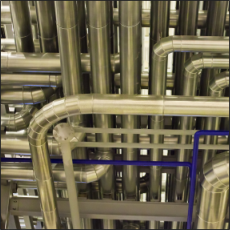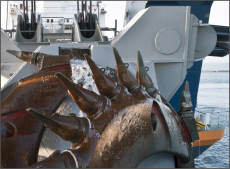Kruse Controls, Inc. Cruising to Success
by Mark Scheer
Businesses are always looking to do things faster, better and more effectively-the consolidation of tasks into a more efficient process is a never-ending effort. In this constant cycle of upgrading, investments in automated systems are a fairly common solution. There is almost no limit to the potential for automating equipment, and Baltimore-based Kruse Controls, Inc. is ready to capitalize on those opportunities. Kruse Controls has logged experience automating any number of systems of a wide variety of industries, but has recently recognized that a very under-served niche is in aggregates, and more specifically, the automation of dredging systems.
Kruse Controls is owned by partners Jay Wise and Mike Sassano. Wise got his start doing end-user system integration work in the steel industry more than two decades ago. “After stints with Bethlehem Steel and International Paper, I got involved with Ray Kruse in 1994, and bought half of that company then. Ray retired in 2000 leaving Mike and me sole owners,” Wise explained. “I had a lot of knowledge when I came to Kruse, but learned even more working as an integrator because we were creating solutions for so many different companies.”
As the company grew, work came in from many channels: the food and beverage industry, pharmaceuticals, and automotive, as well as steel, paper and pulp and chemicals. “There is a lot of competition for automation and integration solution development in all those industries,” Wise added. “But we found the aggregate industry to be further behind in automation so we found our best opportunities here. In the last two years, that is pretty much all we have really focused on because very few have turned to automated solutions for aggregate production. Between aggregate and sand/gravel production, and the specialty niche of dredging, we have gotten a lot of work.”
When getting into dredge automation, Wise discovered that few automation solutions existed, and the PLC (programmable logic controller) systems on the dredges were very underused. “The PLC systems are there to control the variables: speeding up or slowing down motors, opening or closing valves, and other functions like that. But developing the software to tell these systems when and how to manipulate those variables is what we do.”
A manually operated dredge provides a collection of displays and gauges to deliver a wealth of information to a human operator with from which decisions are made on how to control the system. While a great operator can be quite efficient, an effective automation system can react even more quickly and effectively. “An automated dredge still needs an operator to tell that dredge what it needs to do, but that operator no longer needs to control the dredge as it accomplishes those instructions,” Wise explained. “The operator simply puts in the parameters of performance, and then just monitors the dredge to be sure the systems are running smoothly. It takes the stress off the operator, and levels the dredge performance across shifts and over time.”
Creating the algorithms that are responsible for making dredge operation decisions required a tremendous amount of time and effort in partnerships with some of the best dredge operators Wise could find. Kruse Controls is not the only company that can do dredge automation, but few have gone to such lengths. “We have very effective control algorithms, and have built customer interface systems and detailed reporting feedback to tell an owner or manager how that dredge is performing in real time, who is running it, and what their production and downtime is. And we have even allowed wireless connection so owners can access and view their real time dredge performance from anywhere in the world.”
In addition to dredge automation, Kruse Controls has gone to identical lengths in their effort to create effective algorithms for aggregate plant control as well. “We worked with process engineers and plant operators too and built a system that monitors production, weights, scales, belt performance, crusher levels, motor amps and safety interlocks. Just like with our dredge automation, plant automation doesn’t eliminate the operator, but it does take away the demand that the operator make perfect, continuous decisions to run that plant or dredge on a knife’s edge of peak performance hour after hour, day in and day out. That’s what the automation systems are able to accomplish.”
With all the time invested in their code, and the success they have created in this industry, Wise said Kruse Controls remains dedicated to continuing to pursue opportunities in the aggregate industry. “I think this is just the tip of the iceberg right now, and we don’t see any reason to push into something different. We have begun to catch the attention of all the big boys in the industry and top dredging contractors are really starting to take a closer look at what we are doing. I have nothing but confidence in our experienced staff and am very comfortable with our capabilities.”
Wise and Sassano now run an 8-person company, with additional trained staff as consultants and have made a number of strategic decisions to allow them to aggressively pursue opportunities as they arise, while being able to effectively weather the ups and downs of the industry more smoothly. Wise knows that there is almost unlimited potential to the number of systems and industries where they could effectively-and profitably-apply their talents. But getting to know one industry really well, and working to develop the best solutions possible for that industry, is what they want to focus on most. And lucky for the aggregate industry, Kruse Controls has chosen to serve them.












